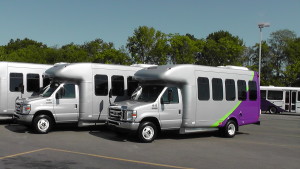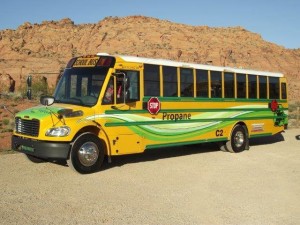Notice: As of January 24, 2024, the program documents and processes have been updated to reflect the new Buy American Act provisions.
State agencies and local governments in current or former specific air quality non-attainment, ozone attainment and/or maintenance areas may be reimbursed for incremental costs to transition to alternative fuels such as electric, natural gas or propane autogas. Agencies and local governments are encouraged to apply. Reimbursements are up to an average of $10,000 for the incremental cost of new vehicles or reasonable aftermarket conversions.
Funding is currently available through September 30, 2024.
- Garaged in program areas of air quality, as recognized by the federal CMAQ program. Click here to download a map of CMAQ areas in Virginia.
- Complete and return the agency Pre-Approval Application.
- Agency or locality agrees to report after one year on an Agency Reporting Form.
- Agency or locality must complete a return a W9 Form.
This program is administered through the Virginia Department of Energy (Virginia Energy), in collaboration with the Virginia Department of Transportation (VDOT).
Fleets that are interested in utilizing this program for the purchase or conversion to new alternative fuel vehicles should first contact Matt Wade (540-568-4051) or Russell Presnell (540-874-2470) with Virginia Clean Cities.
Additional information and application materials are below
Frequently Asked Questions
What is the purpose of this Program?
- The program is intended to reduce air pollution and greenhouse gases associated with government fleet vehicles.
Who is eligible for this Program?
- Local government and state agency fleets located in Air Quality Non-Attainment areas. Click here to download a map of CMAQ areas in Virginia. A non-attainment area is area of the country where air pollution levels persistently exceed the national ambient air quality standards.
How much funding is available?
- Total program funding is approximately $1 million per year.
- The program provides a reimbursement of up to an average of $10,000 for the incremental cost of a new vehicle or aftermarket conversion.
- Incremental costs are defined as:
-
- the entire cost of a certified conversion of an existing vehicle to use at least one alternative fuel
- or the additional cost of purchasing a new vehicle equipped to operate on at least one alternative fuel, over the normal cost of a similar new vehicle equipped to operate on a conventional fuel (gasoline or diesel).
What alternative fuels replacements and conversions can be purchased?
- This program will not fund retroactive vehicle or conversion purchases. All applicants must first submit a pre-approval application.
- Garaged in areas of Air Quality Non-Attainment, Ozone Attainment, or Maintenance as recognized by the Federal CMAQ program.
- Light duty and heavy duty dedicated and bi-fuel propane autogas vehicles.
- Light duty and heavy duty dedicated and bi-fuel compressed natural gas vehicles.
- Electric vehicles
Can I apply for funding for more than one vehicle?
- Each vehicle must meet the eligibility requirements.
- If you need space for additional vehicles on your application, attach additional sheets of paper and include the owner’s name on each sheet and attach to the application.
What is the Pre-Approval and Reimbursement application process?
- An eligible agency or local government submits a Pre-Approval application to Virginia Energy.
- Virginia Energy reviews and approves/denies Pre-Approval application.
- After receiving approval, eligible agency or local government proceeds with vehicle or conversion procurement.
- Applicant receives and deploys new or converted alternative fuel vehicles.
- Applicant submits a Request for Reimbursement to Virginia Energy.
- Virginia Energy verifies purchase and non-attainment area details, and certifies that the proposer agency has complied with the program requirements.
- Virginia Energy forwards the agency request for reimbursement to VDOT. VDOT will process the request within 30 days.
- Virginia Energy, on receipt of these funds, forwards this reimbursement to the agency.
Complete and signed agency Reimbursement forms must include the following:
- Number of vehicles.
- Vehicle conversion or purchase date.
- Vehicle and technology type (i.e., bi-fuel CNG, dedicated LPG, battery electric, etc.).
- Vehicle VIN number.
- Incremental cost of alternative fuel vehicle compared to traditional fuel vehicle. To find comparable vehicle costs, a good resource is the Virginia Sheriff’s Vehicle Procurement website.
- Total amount of reimbursement requested.
- Supporting documentation including copies of receipts, invoices, and cost comparisons of traditional vehicle versus alternative fuel vehicle.
What are my reporting responsibilities after reimbursement?
- Recipients of Program funding for alternative fuel vehicles must report annual mileage and usage to Virginia Energy. Recipients will have to report any disabled vehicles or discontinued use of alternative fuel for vehicles in the Program to Virginia Energy within first five years of operation.
- Within 90 days of conversion VCC will audit bi-fuel conversion vehicles by visual inspection and checklist on a resting and lifted vehicle.
How can I get a Pre-Approval application?
- Download, complete and return a Pre-Approval Application.
- Download an Agency Reporting form.
- Download, complete a return a W9 Form.
- Or call Russell Presnell at Virginia Clean Cities at 540-874-2470 to request an application and reporting form.
- Return application to Edward Cronin at edward.cronin@energy.virginia.gov
How do I submit for a Reimbursement after I receive my new or converted vehicles?
- Download, complete and return a Request for Reimbursement.
- Attach copies of vehicle titles
- Attach copies of paid invoices
- Return Request for Reimbursement and attachments to Edward Cronin at edward.cronin@energy.virginia.gov
How do I acquire the alternative fuel or build a fueling station?
Renewable Natural Gas (RNG): State and local government fleets can now access substantially RNG fuel rates straight from the Virginia state contract. The vendor, Clean Energy Fuels, continues to build out both public and private natural gas fueling stations throughout the Commonwealth. Clean Energy Fuels works closely with many state and local agency fleet managers to help them implement their natural gas fueling programs. This includes on-site private fueling stations, public-access, partnership revenue sharing stations or a combination of these.
- Mike Cecere
Clean Energy Fuels
(917) 583-4087
mike.cecere@cleanenergyfuels.com
Liquefied Petroleum Gas (LPG or Propane or Autogas): State and local government fleets can now access substantially reduced propane and renewable propane fuel rates straight from the Virginia state contract. Alliance AutoGas (www.allianceautogas.com) is a network managed by its parent company Blossman Gas, Inc., providing a comprehensive propane autogas solution for medium and heavy-duty fleets. For approximately ten converted vehicles, Alliance Autogas can install an on-site refueling station at no cost to the fleet. Participating fleets can have access to a growing network of refueling locations across the Commonwealth of Virginia. Please contact one the Alliance Autogas representative below:
- Ellis Chapman
Alliance Autogas in partnership with local governments in Western and Northern Virginia
(571) 271-7946
echapman@blossmangas.com
- Mike Morris
Alliance Autogas in partnership with local governments in Central and Southern Virginia
(804) 283-4003
mmorris@alliancesmallengines.com
- John Phillips
Alliance Autogas in partnership with local governments in Hampton Roads
(804) 695-4661
jphillips@peifuels.com
For more information on alternative fuels, please visit https://vacleancities.org/cleaner-transportation/ or watch the CMAQ Program Webinar below.


